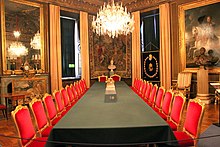Sweden

In Sweden, the King in Council (Swedish : Konungen i Statsrådet), more commonly known as The Royal Majesty (Swedish : Kunglig Majestät or the short forms Kungl. Maj:t or K.M:t) was a concept of constitutional importance until 1974.
The Royal Majesty was the commonly used term to refer to the supreme executive authority under the 1809 Instrument of Government, under which the monarch made all decisions of state in the presence of his Cabinet ministers. The 1974 Instrument of Government removed the monarch from all exercise of formal political powers, which were passed to the newly created government (Swedish : Regeringen), chaired and led in all aspects by the prime minister. The monarch continues to head the Cabinet councils (the sovereign plus the members of the government) and the Council on Foreign Affairs, recognizing new cabinets (in the Council of State).





